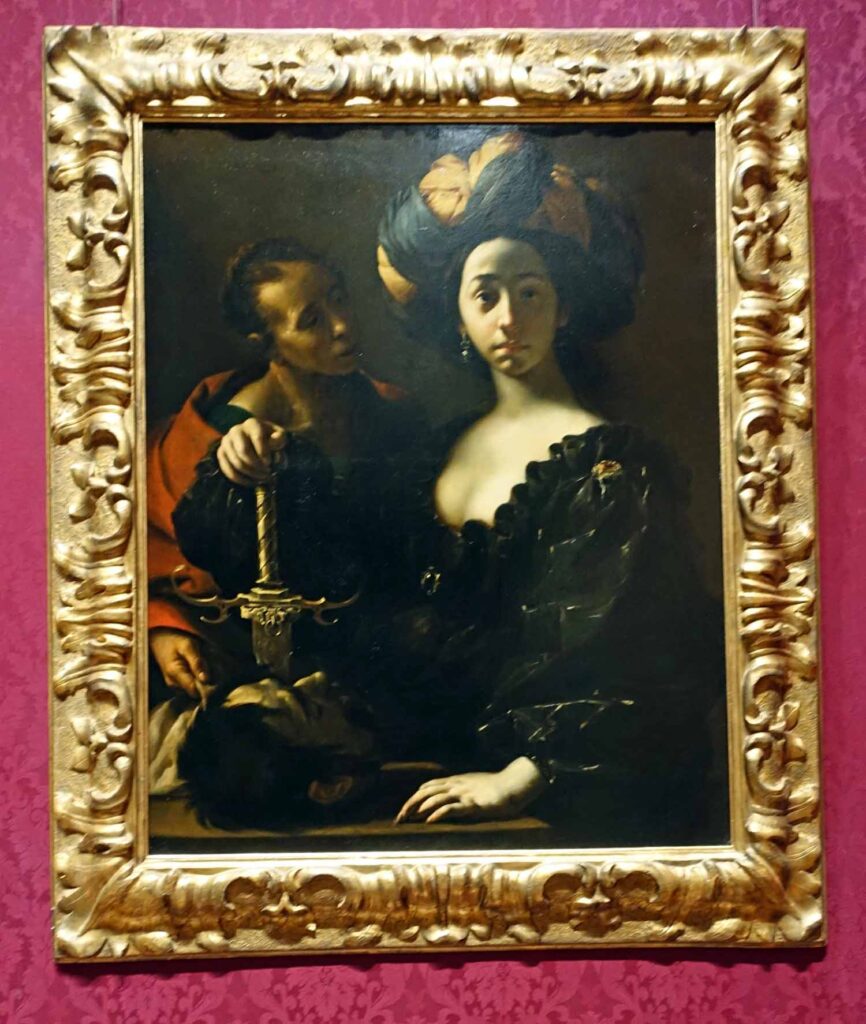In 2021, I emailed 157 art-related items to my members of my free Sunday Recommendations list. (To join, just ask: DuranteDianne@gmail.com.) For supporters, I recommended 52 more items. The items in this and the following two posts are my favorites among them, with the comments I made. Included are 12 items originally shared only with supporters – those are marked with two asterisks.
Novels
Tied for winner:
- Parris, S.J. Heresy (2010). I highly recommend Heresy, the first book in a mystery series featuring Giordano Bruno (1548-1600). Like most Renaissance scientists (including Galileo, whose life overlaps his), Bruno was a scientist with religious premises … or a religious man eager to expand scientific knowledge. Today he’s best known for extending Copernicus’s work on the heliocentric solar system. Bruno proposed – for the first time, as far as we know – that stars are distant suns surrounded by their own planets, and that those planets might harbor living beings. He was outspoken in his theories on both religion and science. When patrons or colleagues disapproved, instead of quietly changing his position, Bruno moved on: from Naples to Venice, Padua to Lyon, Geneva to Paris, Wittenberg to Prague. In 1592, he was arrested by the Inquisition in Venice. Among the accusations were the fact that (counter to the Bible) he believed life might exist elsewhere than on Earth. Following eight years of imprisonment and trial, he was sentenced to be burned at the stake at the Campo de’ Fiori in Rome. His character in Heresy is intelligent and courageous. The novel is set in England in 1583, fifty years after Henry VIII declared himself head of the Church in England; thirty years after “Bloody Mary” reinstated Catholicism as the state religion; and twenty-five years after Elizabeth I’s Oath of Supremacy required that anyone taking public or church office, or teaching or studying at a university, swear allegiance to the ruling monarch as Supreme Governor of the Church of England. The dialogue near the end between Bruno and the murderer (I didn’t guess who it was: kudos to the author) deals with religion vs. science and life vs. martyrdom. It’s unusually thoughtful for a murder mystery. I approve of Bruno’s definition of the “real heresy”. The Bruno series runs to seven volumes – I will eventually write on more of them.

- ** Wells, Martha. Murderbot Diaries series (2017-2021). A series of five novels: start with All Systems Red. The part-organic, part-robot protagonist hacks his governor module so he can act on his own volition. As a result, he has to choose his own values and deal with his own emotions. He’s got a wry sense of humor and an apparently murderous past. I loved Murderbot so much that I read all the books aloud to my husband … and not many books make the cut for that.
Runner up
- Peters, Elizabeth. Amelia Peabody series (1975-2006). The sculpture of Bastet in a post on the Wadsworth reminded me of one of my favorite mystery series, whose main characters are Egyptologists in the late nineteenth-century. There are twenty books in all. The reading on the Audible versions, by Barbara Rosenblatt, is top-notch.
Drama
Wilde, Oscar. The Importance of Being Earnest (1895). Soooo many witty lines. If you prefer to see your plays rather than read them, the most recent movie version (2002) includes Colin Firth, Rupert Everett, and Judi Dench. Ayn Rand called Wilde “A benevolent humorist … in many of his plays, particularly The Importance of Being Earnest” (The Art of Fiction p. 167). All Wilde’s plays are recommended by Leonard Peikoff as “fun to read” (“The Survival Value of Great [Though Philosophically False] Art“). For more on the period in which the play is set, see the Victoria & Albert’s site.

Short stories
Winner: Saki (H.H. Munro, 1870-1916). “The Toys of Peace” (published 1919). Saki, a renowned British writer of short stories, is witty in the way broken glass is beautiful: glittering and dangerous. Usually I restrict myself to reading a few of his stories at a time, so the bitterness doesn’t become too intense. This one seems very relevant in our time. My audio of the story is here.
Incidentally, this year I finished my publication of Collected Short Works of Henry Kitchell Webster and Related Correspondence, with volumes 3 and 4. It turns out my favorite stories are in volume 2, and my favorite play (Mrs. Thornborough’s Apology) is in volume 1. More here. In December 2021, The Objective Standard published my article on Webster’s life and works.
Poetry
I asked myself: which of the poems I recommended last year do I most want you to reread, or to read for the first time, if you missed a week’s recommendations? I ended up with eight, in this order. (Another “incidentally”: one of my subscribers suggested compiling an anthology of poems from the Sunday Recommendations. That’s in the works. It what made me start thinking about order and flow, rather than just listing poems.)
To spare you clicking all these links, but also keep the post from going on forever, I’ve put all the poems in full in this PDF. Have I mentioned (more than 64 times) that poetry is more effective read aloud, even if it’s only to yourself?
- Byron, Lord (George Gordon Byron, 6th Baron Byron, 1788-1824). “The Isles of Greece” (1819). Byron sees the ghosts of greatness and urges the Greeks to fight to live up to their past. Think of this as a longer version of Dagny’s “Don’t let it go!”, at the end of Part 2 of Atlas Shrugged. I had an inspiration for how to present this with annotations in a video: see it here. Favorite lines:
The mountains look on Marathon—
And Marathon looks on the sea;
And musing there an hour alone,
I dream’d that Greece might still be free;
For standing on the Persians’ grave,
I could not deem myself a slave. …
- Sill, Edward Rowland (1841-1887). “The Reformer“. Favorite lines:
When the red dust has cleared, the lonely soldier
Stands with strange thoughts beneath the friendly stars.
- ** Goethe, Johann Wolfgang von. “Prometheus” (1772-1774). The translation is from Wikipedia, which also has the German original. For Goethe in Bryant Park, New York City, see here. Favorite lines:
Cover your heavens, Zeus,
with gauzy clouds,
and practice, like a boy
who beheads thistles,
on the oaks and peaks of mountains;
but you must allow
my world to stand,
and my hut, which you did not build,
and my hearth,
whose glow
you envy me. …
- ** Hugo, Victor. “Victor sed victus” (“Victor but vanquished”) (1877). By the early 1870s, Hugo was a towering figure in the French literary world and an intransigent voice in French politics as well. In 1871, he became the guardian of his grandchildren Jeanne and Georges. At a time when children were still expected to be seen and not heard, his indulgent treatment of his grandchildren shocked contemporaries. One of Hugo’s last published works was L’Art d’être grand-père (The Art of Being a Grandfather), 1877. The title is a Latin pun: “victor” is Hugo’s name as well as the Latin word for “conqueror”; “victus” is “conquered”. You can listen to the original French here. My rough translation aims at content rather than style, since writing in rhyming couplets, or even in meter, is beyond my literary skills. Favorite lines (tough to choose!):
When tyrants were throwing from on high
Their black thunder, with crimes for lightning-bolts,
I threw my somber verse on those passing dangerous men. …
- ** Lawson, Henry (1867-1922). “The Man Who Raised Charlestown.” This poem was suggested by an incident in G.B. Shaw’s The Devil’s Disciple (1897). HT Sam Axton, who sent this after I recommended Lawson’s “The Iron Wedding Rings“.
And a thrill went through the city ere the drums began to roll,
And the coward found his courage, and the drunkard found his soul.
So a thrill went through the city that would go through all the land,
For the quiet man from Buckland held men’s hearts in his right hand. …
- Longfellow, Henry Wadsworth. “The Arrow and the Song” (1845). There’s a reason it’s a classic. This one appeals to me because people often don’t tell me until years after I’ve presented a lecture or published a book that they loved it. That’s what I get for not writing on topical subjects … Favorite lines:
I breathed a song into the air,
It fell to earth, I knew not where;
For who has sight so keen and strong,
That it can follow the flight of song?
- ** Sill, Edward Rowland (1841-1887) “The Open Window“.
For all the while I had burrowed
There in my dingy tower,
Lo! the birds had sung and the leaves had danced
From hour to sunny hour. …
- Braley, Berton (1882-1966). “Merchant Adventurers“. With thoughts of all those who bring us gifts from distant lands … HT Steve B. Favorite lines:
Don’t you believe it – that spirit is glowing
Under the Business Man’s vest;
Jasons of Trade are still joyously going
Forth on a magical quest.
Gambling with Fate, burning bridges behind them,
Wagering all in the till,
Bucking the world for a profit, you’ll find them
Merchant Adventurers still!
Blog posts
My blog posts are frequently about artworks in museums I’ve visited, because writing the posts gives me the chance to “revisit” favorite works when I’m no longer on site. This year’s favorites:
- “Enchanted: A History of Fantasy Illustration,” exhibition at the Norman Rockwell Museum in Stockbridge, MA; part 1 and part 2
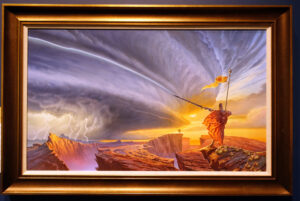
- “A Visit to Chesterwood” (home of Daniel Chester French), Stockbridge, MA. Five parts, here
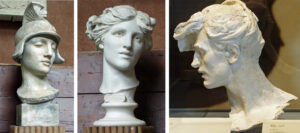
- “Visiting the Ringling Museum,” Sarasota, FL. Three parts, here
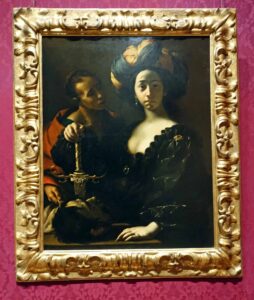
- “Wadsworth Atheneum,” Hartford, CT. Twenty parts (!!!), here
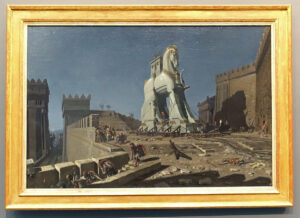
Next week: favorite recommendations from 2021 in painting and sculpture.
More
- In 2021 I published The Financial Programs of Alexander Hamilton, by a Farmer’s Daughter. It required a massive amount of research and writing, but I’m very glad I did it, and delighted that it has received such positive comments.
- Also out this year: the last two volumes of my edition of Henry Kitchell Webster’s Collected Short Works and Related Correspondence (vol. 3, 1915-1922, and vol. 4, 1922-1932).
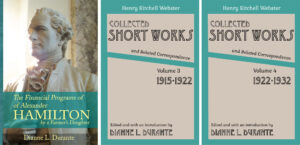
- For more of my writings, see the Books and Essays page. All my books are available in Kindle and/or print format via my Amazon author page. And check out dozens of videos from 2021 on my YouTube channel.
- For favorites from earlier years, see the Favorite Recommendations and Photos link.
- Want wonderful art such as these recommendations delivered weekly to your inbox? Check out my free Sunday Recommendations list and rewards for recurring support: details here.
